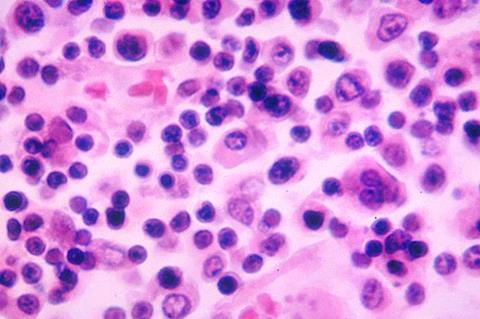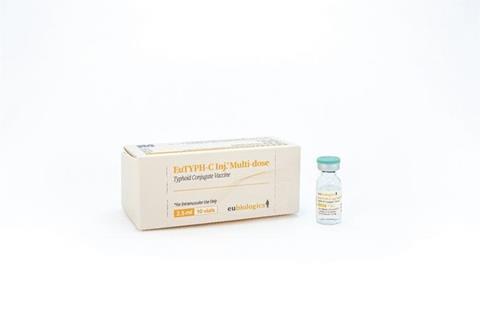PATH and EuBiologics Co., LTD have announced Phase 3 results from a clinical trial of a typhoid conjugate vaccine (TCV), EuTYPH-C Inj.® Multi-dose. EuTYPH-C Inj.®

Multi-dose is manufactured by EuBiologics Co., LTD, Republic of Korea. The results, published in The Lancet Global Health, demonstrate that EuTYPH-C Inj.® Multi-dose is safe and immunogenic in typhoid-endemic populations in sub-Saharan Africa.
READ MORE: Study: Experimental bird flu vaccine excels in animal models
READ MORE: Improved oral cholera vaccine achieves WHO PQ
The study was conducted at sites in Kenya and Senegal in healthy adults, children, and infants, and evaluated the safety and non-inferiority of EuTYPH-C Inj.® Multi-dose compared to a World Health Organization (WHO) prequalified comparator TCV, Typbar TCV®. The study also assessed co-administration of EuTYPH-C Inj.® Multi-dose with measles-rubella and yellow fever vaccines at 9-12 months of age and antibody levels over 6 months.
“Safety is of paramount importance when evaluating a new vaccine. EuTYPH-C Inj.® Multi-dose was shown to be well tolerated across all age groups, with a similar safety profile to the comparator vaccine,” says Patricia Njuguna, Senior Medical Officer, and project lead of the study from PATH. “No safety concerns were identified, with no serious adverse events related to vaccination noted.”
Immune response
Immunogenicity, which measures the body’s immune response, was evaluated in participants 9 to 12 months of age. Immune responses from both single-dose and multi-dose presentations of EuTYPH-C Inj.® Multi-dose were non-inferior to Typbar TCV at 28 days post-vaccination. Seroconversion rates were high at 28 days post-vaccination and remained high at 6 months post-vaccination. Additionally, coadministration of EuTYPH-C Inj.® Multi-dose with other childhood vaccines did not interfere with immune responses to the different pathogens.

“These results are a positive step toward our goal of providing a safe and effective vaccine to prevent typhoid in endemic areas. They are the pivotal data that supported licensure from the Korean Ministry of Food and Drug Safety and will support WHO prequalification, which is our next step for this vaccine,” says Youngjin Choi, Managing Director, Clinical Development Division, EuBiologics Co., LTD. “We welcome the results from this trial and are looking forward to supplying EuTYPH-C Inj.® Multi-dose to countries with a high burden of typhoid.”
Strict standards
WHO prequalification is a designation that ensures a vaccine meets strict international quality, safety, and efficacy standards and that allows it to be procured by United Nations agencies and Gavi, the Vaccine Alliance. There are currently four prequalified TCV products, two of which are available for Gavi-eligible countries. Additional products from diverse manufacturers help to drive down vaccine prices, maintain a strong healthy supply, and increase access.
“Demand for TCVs in Gavi-eligible typhoid endemic countries has been high. To date, seven Gavi-eligible countries have introduced TCV, with several more in various stages of the planning and introduction process,” says Dr. Emmanuel Mugisha, Global Director for Vaccine Implementation and Director of TyVAC at PATH, a consortium that aims to accelerate the introduction of TCVs in typhoid-endemic countries. “The potential for an additional product will help ensure a stable vaccine supply for countries interested in introducing TCV as part of their typhoid prevention and control plans.”
Typhoid threat
This study enrolled 3,219 healthy participants aged 6 months to 45 years old at two study sites in Kericho, Kenya, and Sandiara, Senegal. Study partners included PATH, EuBiologics Co., LTD, Kenya Medical Research Institute (KEMRI)-Walter Reed Army Institute of Research (WRAIR) Kericho, and Institut de Recherche en Santé, de Surveillance Epidémiologique et de Formation (IRESSEF). The study was funded by EuBiologics Co., LTD and the RIGHT Foundation grant number RF-2021-V01.
Typhoid is a serious and potentially life-threatening illness that primarily impacts children younger than 15 years old in Asia and sub-Saharan Africa. The Global Burden of Disease study estimates that in 2021, there were more than 7 million cases and more than 93,000 deaths due to typhoid. While typhoid is treatable with antibiotics, drug resistant typhoid is increasing, raising the urgency for preventative measures including TCVs and improvements to water, sanitation, and hygiene. More than 90 million children have been vaccinated with TCVs through introduction campaigns so far.
Topics
- Asia & Oceania
- Bacteria
- Clinical & Diagnostics
- Emmanuel Mugisha
- EuBiologics Co., LTD
- immunogenicity
- Immunology
- Industry News
- Infection Prevention & Control
- Infectious Disease
- Medical Microbiology
- Middle East & Africa
- One Health
- PATH
- Patricia Njuguna
- Research News
- seroconversion
- typhoid
- USA & Canada
- Vaccinology
- WHO prequalification
- Youngjin Choi







No comments yet